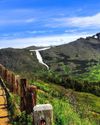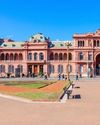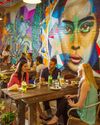
Situated on the Arabian Peninsula, often amid Middle East chaos and turmoil, Oman manages to maintain a countenance of decorum and civility. Evading military clashes between its neighboring states, it implemented long-range plans for development and emergence. Much of the activity focuses on its capital city, Muscat.
Lying between the El Hajar Mountains and the Arabian Sea, Muscat serves as the seat of the country’s political, administrative and economic systems and home to a third of the country’s 4.5 million residents. With its proximity to the sensitive Strait of Hormuz, Muscat proved a historically important trading port in the Gulf of Oman, attracting foreign tradesmen and settlers who came to trade in fishing and agriculture. Persians, Spaniards and Ottomans were among overseas travelers to ancient Muscat, admired as “very elegant” by a 16th-century Portuguese writer.
Muscat’s sprawling 1,400 square miles divide into three principal urban areas: Muscat proper, the original settlement and now an enclave of restored historic homes and buildings; waterfront Mutrah, the harbor scene of shipping and cruise ship anchorages, upgrading to enhance its appeal to visiting tourists; and the commercial district centered in Ruwi, a cluster of high-rise apartments, office buildings and headquarters of international companies.
This story is from the March 2021 edition of Global Traveler.
Start your 7-day Magzter GOLD free trial to access thousands of curated premium stories, and 9,000+ magazines and newspapers.
Already a subscriber ? Sign In
This story is from the March 2021 edition of Global Traveler.
Start your 7-day Magzter GOLD free trial to access thousands of curated premium stories, and 9,000+ magazines and newspapers.
Already a subscriber? Sign In

Nurturing Nature
Connect with the abundant flora and fauna of Belize.

Sojourn by the Sea
Discover plenty to smile about in Thailand’s exotic islands.

Colorado Dreaming
For family ski fun, Snowmass and Beaver Creek steal the show.

The Great Outdoors
Anchorage opens the door to all that is wild in Alaska.

Buenos Aires on Foot
Hit the highlights with online itineraries and the city’s free app.

Above and Beyond
Global Traveler celebrates the 2021 winners of the GT Tested Reader Survey awards.

Wellness Wonderland
Reboot at Lake Austin Spa Resort in Texas Hill Country.

Good Vibes
Adelaide’s West End thrives as a hip urban hub close to nature.

Solo Voyages
Cruise lines adapt policies to accommodate those traveling alone.

Grand Slam
Follow the pro tennis tour around the world.